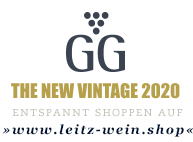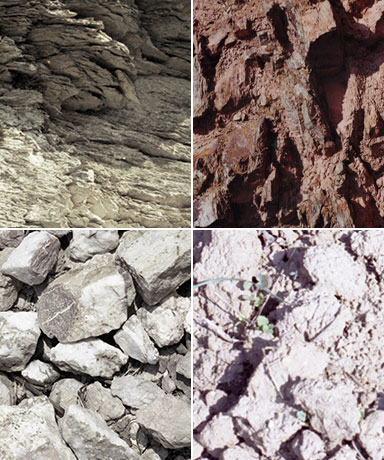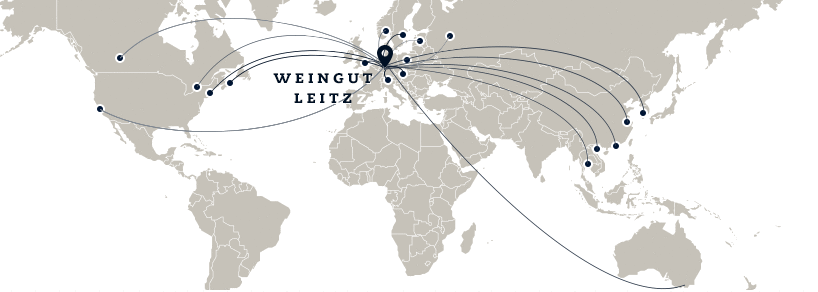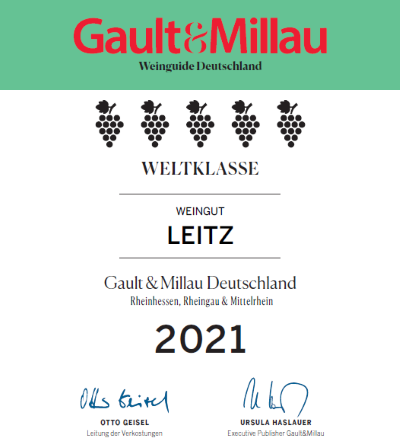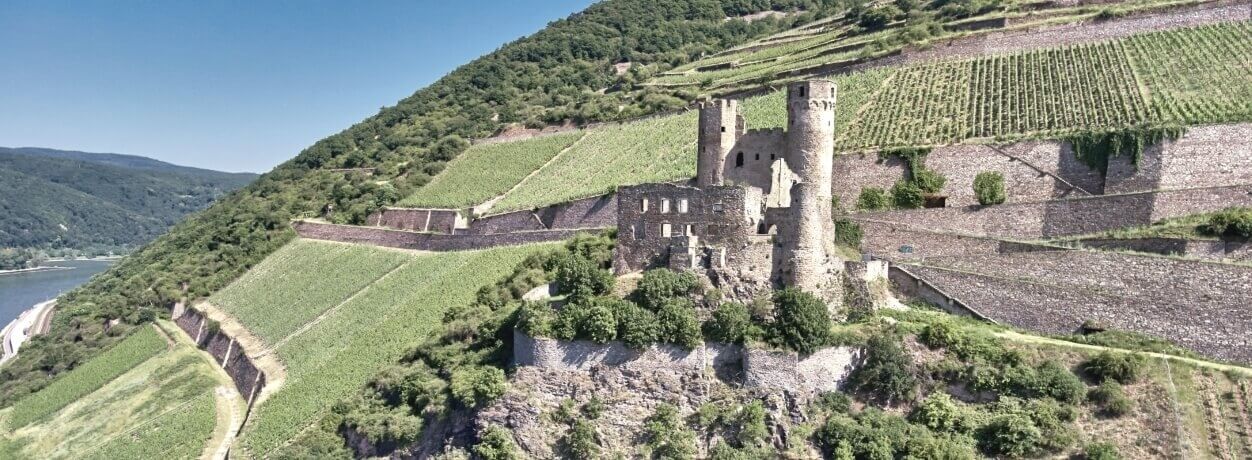Locations

Johannes Leitz
German winemaker of the year 2011: Johannes Leitz
~
Johannes Leitz
Curriculum Vitae
~
There are recorded documents linking the Leitz family winemaking history all the way back to 1744.
Johannes Leitz was born much later, in 1964 in Rüdesheim. His Grandfather, Josef Leitz re-built the winery, which has been completely destroyed after a bombing raid during the Second World War. His father, Antonius Leitz had briefly taken ownership of the winery before his premature death in 1966. This left his wife, with her flower shop, a household and of course the family winery to run. So, it wasn’t until 1985 when Johannes took over the winery that it once again became a primary focal point of attention.
After taking hold of the family business, he has managed to raise the estate from 2.9 hectares to the 140 hectares that we see today. Over the years, Johannes has gained national and international recognition for his outstanding wines. Internationally, his major markets include Norway, Sweden, the UK and USA.
The growth of the winery has had a positive influence over all the ranges of the wines produced. Specifically the Rüdesheim vineyards of Berg Schlossberg, Berg Rottland and Berg Kaisersteinfels have continued their tradition of being amongst the top dry wines from Germany. All of Johannes’ wines carry his individual signature and show off the varied greatness of the Rüdesheim terroir from which they are born.
With all the growth Johannes has achieved he subsequently produced the new label of Dragonstone and EINS-ZWEI-DRY. These two successfull labels have been recognized and won the “IF Communication Design Award 2009”. In 2011 he has been awarded as “winemaker of the year” by Gault Millau wine guide and in the following years Johannes has made it with his winery to become one of the most popular German wine growers.
These international successes have been a boon: however, Johannes has stayed true to his roots and homeland. He has been working closely with the Ministry of Environment to restore the traditional terraces above Rüdesheim in the Berg Rottland and Berg Kaisersteinfels vineyards and is very pleased to have his son Antonius joining the team as the next generation. A wonderful family story from Rheingau, to be continued…
~
Geschichte

Erinnerungen an die Weinlese 1904. Die zweite von rechts im Bild ist Johannes Leitz Großmutter.

Toni Leitz – Der Vater von Johannes Leitz – auf seinem Pferd Robert.

1981—1983 Winemaking appprenticeship
|1983—1986 Master degree in viticulture
|1985 First vintage under Johannes
|1991 Discovery through Stuart Pigott - and the resulting business trip to England
|1996 Stepped into VDP and re-build winery
|1999 Official ownership changed to Johannes Leitz
|2000 First major business trip into the United States of America
|2002 Creation of the label “Dragonstone”
|2007 Creation of the label “EINS-ZWEI-DRY”
|2010 Construction of the new and modern cellar
|2013 Completion of the cellar extension
|
Soils

LOESS LOAM AND QUARTZITE
Bischofsberg, Klosterlay, Magdalenenkreuz
~Ice age dust is found in most of yineyard soils. Storm winds moved these fine dust particles from ancient gravel beds deposited by wide rivers. The dust dropped out of the wine in shielded locations accumulating to thick loess beds. The fragile substrate makes it easy for roots to penetrate deep into the soil and reach water and nutrients. The most important property of the loess is its high available soil water capacity. The silty soil is easy to manage but is also readily washed away. The sandy loess is partially mixed with gravel sediments of the former terrace banks of the Rhine, with quartzite or slate or coarse coastal sediments from the Tertiary.

QUARTZ AND QUARTZITE
BERG ROSENECK
~Summits of the Taunus mountain range consists of a hard rock called quartzite. The sandy sediments washed out of long gone mountain ranges were deposited near a coast during the Lover Denovian (about 400 million years ago). These deposits were soon compacted to form sandstone, which was subjected to high pressures when it became buried beneath thick layers of rocks. This resulted in a modification of the crystalline structure of the sandstone turning it into a hard quartzite and finally to Taunus mountains. The Taunus quartzite contains more than 90% quartz (SiO2) and very little impurities. Therefore, the rock has a very low carbonate and iron oxide content. The mineral nutrient content is low. The weathering processes of quartzite and slate results in solid white quartzite blocks. They are particularly wheather resistant and therefore accumulate the soil.

GREY SLATE
BERG ROTTLAND
~Slates are debris soils where the landscape is dominated by a grey color of the weathered grey-blue Hunsrueck slates. Dark-brown humus rich topsoil is often covered by slate debris and rubble which protects the soil from desiccation. The spaces between the loose materials are therefore well aerated. It is possible to feel loess as well as clay and mineral-rich fine earth derived from weathered slate. The vines are well supplied with minerals such as potassium, magnesium, sodium and iron from the clay fraction. Slate weathers rapidly thus ensuring a continuous supply of nutrients and mirco-nutrients.

RED SLATE WITH QUARTZITE
BERG KAISERSTEINFELS & BERG SCHLOSSBERG
~Here , the soil contains a combination of red clay slate with mixed-in quartzite. The red slates are soft water sediments. Red coloring is a result of the iron content of these slates that have been oxidized to iron oxide under an arid climate, leaving a very rocky, hard soil. It has less minerals than the rich soils of grey slate but still much more than the quartzite soils. The remaining thin layer of soil is very stony and can only store a limited amount of water. In addition to this, the dense, clay subsoil is very difficult for roots to penetrate, creating demanding conditions for grapevines. The soil is quick to warm because of the low water content and high solar radiation levels along the slope. As a result, the vine experiences water stress early in the year and must somehow cope with the available water. The plants react by reducing the number and size of the grapes. Therefore, these sites produce low yields of very aromatic grapes.
Leitz in Transit

Terraces and Vineyards
News
19th until 21st March 2023
ProWein 2023 | International trade fair
ProWein is the only international trade fair that covers the complete world market. Correspondingly international are the visitors. And these are exclusively connoisseurs of the industry, because the controlled admission means that there are only professionals among themselves at ProWein. Traditionally, it's all about business at the order trade fair from the initial conversation to the high number of business deals. The ProWein trade fair will open its doors soon in Düsseldorf. Wine professionals from all over the world from the trade and gastronomy sectors are expected. The focus is on around 6,000 exhibitors from 61 countries. In addition, there will be more than 500 master classes & events. Themes that are moving the international industry this year: Wines and spirits with no and low alcohol, alternatives to the traditional glass bottle. You´ll find us at our booths in hall 1: Weingut Leitz - stand A100-1 (VDP area) AND JJ LEITZ - stand A03 (WORLD OF ZERO)
»http://JJ Leitz GmbH of Rüdesheim am Rhein at ProWein 2023 in Düsseldorf -- ProWein Trade Fair/«
Awards
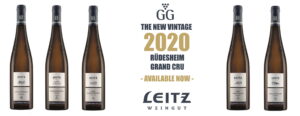
The Wines

EINS-ZWEI-DRY
Rheingau Riesling dry
On the nose the EINS-ZWEI-DRY shows very pleasant fruit and rich yeasty notes. Nuances of peach and apricot and ripe apples . The delicate and lively acidity is supported by ripe mirabelle and is an outstanding example of the terroir of the Rheingau. The wine offers a quite full and spicy aroma of ripe Riesling fruit and also pineapples. Medium-bodied and slightly salty this is a clear, elegant and very pleasurable Riesling, ideal for many occasions. Bright citrus notes such as vibrant tangerine and soft grapefruit explode onto your palate, whilst lively notes of minerality tickle the palate. With a crisp finish, that leaves your taste buds wanting more, this wine is just asking to be drunk over and over again. The EINS-ZWEI-DRY has a really good concentration, which makes this wine suitable for storage – that´s pretty remarkable for an entry-level wine.

EINS-ZWEI-DRY ORGANIC
Rheingau Riesling dry
The EINS-ZWEI-DRY ORGANIC is a new wine in our portfolio. It is a cross-section of various Rheingau loess and clay soils with an appealing dry character. The wine is characterized by effusive aromatics and mineral structure. Racy and rather compact, this dry organic Riesling has crisp pear character. Nice, sappy, medium-bodied palate with some earthy power at the finish. The vintage is very attractive and shows high grape quality. It´s a new category which we want to work with; wines organically farmed and decently produced with passion, love and a strong believe in a better environment through better farming practice. Our EINS-ZWEI-DRY ORGANIC will become a permanent part of our range and we are very much looking forward to the coming vintage - an exciting journey has begun. Drink now.

WEISSBURGUNDER "W"
Rheingau Pinot Blanc dry
On the nose, the WEISSBURGUNDER presents itself with cool minerality and an opulent nose. Here, too, we find almost vintage-typical slightly herbal nuances with a spicy yeast note. The fine exoticism of the vintage plays out here in a very nuanced way from lychee and mango to papaya and the finest hints of passion fruit to the delicate, almost creamy finish created by the long yeast contact. Quite a powerful dry Pinot Blanc from our eastern fileds in the Rheingau; close to Hochheim. It has so much ripe pear fruit that it easily fills out the full body, with the fine tannins accenting the finish. The wine has been fermented in our new oak barrels and spent around 6 months on the yeast, before it has been bottled in May. Excellent integration of fruit and delicate oak. Drink or store - a slight maturation might become very interesting.

CHARDONNAY -C-
Rheingau Chardonnay dry
Our newest project - the CHARDONNAY from our new large wooden barrels. A great wine with delicate smoky notes, paired with a fine fragrance of ripe pear, peach and a little honeydew melon. In the mouth, the wine presents itself with beautiful vibrant aromas of peach, melon, and light starfruit notes marry perfectly with the beautifully understated oak creating a subtle nutty spice with well accentuated and very appealing acidity. Clear mineral hints in the finish, as well as an elegant hint of wood, round off the taste and make our first Chardonnay a real "wow experience"! This Chardonnay is gripping and clearly shows its fruity character in the first sip. The perfect companion for relaxing evenings and an ideal food companion. We are convinced that this new project will be also nicely performing with increasing maturation.

RÜDESHEIM
Riesling dry
The nose is full of cool minerality and very delicate nuances of fruits, such as apples, peaches and lychee. This is a fascinating interaction with the derivative flavours of fermentation. The good ripeness of 2022 and the beautifully integrated acidity on the medium body complete this fascination of taste. The mineral impact on the tongue is very obvious and distinguishable from the entry-level. Only right at the end of the long finish do you feel the citrusy acidity a little, but even there there’s excellent harmony. The tender "oily liquidity" of this wine amazes us with each sip. RÜDESHEIM shows rudimentary what we want to show with our "village"-category. But as an independent wine in our portfolio the Rüdesheim Riesling fills the mouth with nuances of stone fruit and the typical Riesling fruit. This wine has been fermented in steel and shows up also with exotic impressions of ripe Mango; Mirabelle, peach and subtle hints of wild herbs are easy to detect.

MAGIC MOUNTAIN
Rüdesheim Riesling dry
The nose is fresh and pure with exotic hints, chamomile and lemon zest. It promises a delicate body with a slight creaminess and shows on the palate an amazing mineral impact with a wonderful texture and a rather long finish. Marvelous integration of fruit, mineral acidity and creaminess from long lees contact in wooden casks. You will find a cool minerality beside the appealing fruit.The exotic fruits, such as lychee, mango, papaya and very subtle hints of passion fruit, create with the mellow impact of yeast an awesome impact on the nose.The MAGIC MOUNTAIN excites your mouth through its delicate minerality and nuances of ripe apples, mirabelle and peach. The subtle herbal characteristics that are so typical for the Rüdesheim mountains are also recognisable. We recommend pairing this wine with grilled Tuna with teriyaki vegetables, or zander with avocado-cubes and a passion fruit foam.

ROSENGARTEN GG
Rüdesheim Riesling dry ~MONOPOLE~
The ROSENGARTEN GG from the 2020 vintage presents itself on the nose with a (still) slightly yeasty, tart-spicy aroma with yellow-fruity, dried-herbal and clearly mineral aromas. A deep well of ripe mirabelle and persimmon on the nose. Then comes the rich and concentrated but silky and precisely balanced palate. Very long and expansive finish with a fabulous texture and a delicate floral-honey touch. As in previous vintages, pure juicy Riesling fruit with fine acidity delights us in the glass. The intense minerality and a hint of sweetness in the background accompany the sip with good depth and a very good, firm finish. Very good drinking maturity already at this stage; we are very much looking forward to the next years with this wine.

BERG ROSENECK GG
Rüdesheim Riesling dry “Katerloch”
The 2020 vintage has given the BERG ROSENECK GG a slightly spicier, nuttier aroma with a very light floral scent. Appealing yellow fruity aromas accompany us in the further moments. Marvelous but very youthful nose of orange blossom and bergamot with notes of wild herbs. Ripe and concentrated, yet sleek and tense. Great energy at the super-focused, Amalfi-lemon and wet-stone finish. Warm, caramel and buttery-melting fruit; as well as the somewhat smoky and yet very distinct minerality testify to the noble origin. The dancing acidity has enough power to create a very pleasantly spicy and at the same time clearly mineral finish. This once again typical BERG ROSENECK already impresses with a very sophisticated attack and will unfold its full radiance with increasing maturity.

BERG ROTTLAND GG
Rüdesheim Riesling dry “Hinterhaus”
Another typical GG from the BERG ROTTLAND. A fascinating, lightly herbal and delicately tangy aroma of ripe, partly candied yellow fruits with mineral smokiness buzzes out of the glass. Stunning nose of white and yellow peach with minty freshness and hints of wild flowers. The quite juicy Riesling fruit and the finest notes reminiscent of pears surround the first sip with a very pleasantly moderate acidity. Super-elegant and filigree. All the elements are so tightly interwoven in this classic example of this famous site, the finish extremely focused and precise with so much crushed-rock character.The wine has a lot of grip and flatters with spicy accents. We enjoy the clear, tart minerality, which comes along with light nuances reminiscent of fennel. We are thrilled, the wine becomes deeper and more complex with air - very good, juicy, spicy and mineral finish, again with noticeable, but above all with time, well-integrated sweetness.

BERG SCHLOSSBERG GG
Rüdesheim Riesling dry “Ehrenfels”
The 2020 vintage makes the BERG SCHLOSSBERG appear more tart, firmer and deeper than last year (2018). An exciting, herbal scent with yellow-fruity, slightly yellow-spicy and clearly mineral notes rises in the nose. Ripe, firm, juicy, partly candied, sweetish fruit and a very fine, ripe acidity play with each other on the palate. Deeply hidden we find a very appealing mineral touch and hints of dark berries. A very concentrated and tightly wound wine with great crushed-rock minerality that expands and expands on the super-ripe and silky finish. Just doesn’t want to stop! The finish is a very spicy firework with subtle fennel notes. The wine still seems to be somewhat at rest after 21 months of yeast ageing, but at the earliest stage of bottle maturity, it can already make its presence felt and makes us look forward to the years to come in joyful anticipation. One thing is certain, great mountain wine cinema is developing here!

BERG KAISERSTEINFELS GG
Rüdesheim Riesling dry “Terrassen”
This wine is only fit for superlatives. It delights us in every second of the argument; already jumps at us in the glass with a very clear trace of exotic fruit and sweet honey. However, we also find light notes of smoke and juicy fruit. In the mouth, the 2020 BERG KAISERSTEINFELS GG unfolds a spicy firework, carried by an almost never-ending minerality. Breathtakingly fine and filigree with delicate floral aromas. The amazing thing is that the enormous concentration gives this wine almost no weight. Then comes the gigantic mineral finish, which has a dizzying intensity for only 12.5% alcohol. The 17 months of yeast ageing give this wine from the barren soil an enormous grip and at the same time delights with subtle spiciness. Elegant support is given to this taut train by finely nuanced wood, which joins in. Exotic fruits like mango and star fruit play a role. A very fine wine with an endlessly long finish and great tension.

Rüdesheimer KIRCHENPFAD
Riesling Kabinett off~dry
The Kirchenpfad Kabinett shows very elegant flavour of ripe apples and pears beside exotic hints of exotic fruits, such as lychee, papaya, mango and passion fruit. It´s yeasty zest is so typical for the current portfolio and also very easy to detect - it provides with the opulent fruit a sensation of smell. On the palate this sensation of smell turns into a sensation of taste, with an interaction of ripe and sweet apples, a slight exotic impression and you will discover that the vintage shows up in that wonderful combination of ripeness and well embedded acidity. Due to the slightly extended fermentation you will detect the very elegant flavours of yeast easily beside the harmonious fruit. It´s a nice treat to share this wine with food and good friends We recommend to pair this Kabinett with a rich Sushi-combination, sesame oil, ginger and sweet wasabi sauce, or with a light sweet mango chutney and Macadamia nut crusted Mahi Mahi.

BERG KAISERSTEINFELS
Rüdesheimer Riesling Kabinett off~dry
On the nose you will find a very fresh and cool, but also very delicate minerality of our mountain terraces which is accompanied by an animating scent of yellow fruit. There are subtle hints of mango, passion fruit and papaya which are truly sassy and luscious. The BERG KAISERSTEINFELS Kabinett coats your mouth with an impressive mineral impact, with ripe apples, mirabelle and white peach. You will also detect easily the haze of wild herbs, which is so typical for the adjacent Berg Roseneck. Despite its youth ypu can detect there will be an exceptional development and we´re absolutely convinced that the elegant embedded acidity will give us a vast number of moments of happiness. We recommend pairing this wine with different types of Sushi Rolls, such as Shrimp Tempura and Dragon Roll or a Sichuan-style Mapo Tofu.

Rüdesheimer Magdalenenkreuz
Riesling Spätlese sweet
The vineyard "Rüdesheimer Magdalenenkreuz" is located to the east of our town where you will find the gentle hills with profound loess and loam soils, good content of chalk that secure even in hot years a sufficient water supply. The vines are bearing enduring and fruitful wines. The Magdalenenkreuz Spätlese has a savoury nose with fruity hints of ripe apples and pear; as well as an exotic trace of grapefruit, orange and quince.The perception of taste creates in conjunction with the exceptional play of fruit and acidity a very unique exaltation and withal an intense finish.Beside these expressive scents of fruit, subtle mineral hints are joining this sappy Riesling-variation. The Spätlese shows how simple a Riesling is able to compete with substantial dishes and offers a wealth of possible combinations. We enjoy this wine with Curry, peach slices, with a condimental Biryani-chicken, or on its own with dark chocolate.

BERG ROSENECK
Rüdesheim Riesling Spätlese
A rich nose with elegant ripe hints of exotic fruits, such as passion fruit, mango, lychee and physalis welcomes you in the first moment. There´s a scent of herbs and lime that seems to fall in love with the wild yeast aromatic of this delicious masterpiece. On the palate you will find a very airy middle section which keeps this refreshing and modern styled Spätlese in balance with an enthralling and fascinating acidity. The mineral impact gives us the feeling of licking pebbles and this Spätlese seems to be more dry styled than it is. Due to it´s youth, the BERG ROSENECK Spätlese of this vintage is a the very beginning of it´s long journey. As a food recommendation for this wine, we suggest mixed sushi, hotate no sashimi, grilled clams with Asian vegetables, or strong cheese.

EINS-ZWEI-DRY Pinot Noir
The grapes were pressed after a two-week maceration period and fermented spontaneously. The dryness in the months of July and August resulted in extremely small-berried grapes, which produced a special aroma. After approx. 12 months of fine yeast storage in barriques (third racking), we bottled this wine and stored it again in our cellar to allow it to mature further. This wine is thus a "small Résérve". On the nose, this Pinot Noir presents a typical scent of cherries, complemented by a hint of vanilla, currants and cedar. It is slightly less fruity than the previous vintage, but more grippy and dense. Rich, dense violet colour, naturally young but intense. A fleshy, spicy stuff, dense, smoky, with hints of soy sauce and toasty wood notes. Dark berry fruits join in. A very appealing mouthfeel makes this Pinot Noir an excellent food companion.

EINS-ZWEI-ZERO Riesling
alcohol free
The Leitz EINS-ZWEI-ZERO offers an appealing character with fresh notes of lime and citrus, accompanied by little hints of red apples on an underlying mineral base. The finish is slightly off-dry and relatively long. As we all know, like fat, alcohol is a transporter of flavor, and without it, there needs to be something else to carry those flavors. Residual sugar does the work for this stunning Riesling, though the sugar is nearly eaten up by acidity. It retains its wine-like aromas: fresh apples, orange and tarragon. Enjoy life - with lesser alcohol!

EINS-ZWEI-ZERO Sparkling Riesling
alcohol free
The EINS-ZWEI-ZERO Sparkling Riesling is a very appealing, alcohol-free sparkling wine, which is very fresh and juicy right from the start. In terms of taste, the EINS-ZWEI-ZERO Sparkling Riesling offers a fine interplay of crisp apples and fine bubbles with well-integrated acidity and a long-lasting freshness. It pairs perfectly with mussels and light pasta; truffled or with seafood. It is ideal as an aperitif and shines all year round as an alcohol-free companion for every festive occasion.

EINS-ZWEI-ZERO Blanc de Blancs
alcohol free
The EINS-ZWEI-ZERO-Blanc de Blancs offers fresh notes of lime and citrus in the nose; subtle hints of gooseberry and carambola are easy to detect. The intensity of the acidity is not to compare with the EINS-ZWEI-ZERO Riesling. The blend is made of very aromatic white varietals which show up with a sklightly off-dry finish and relatively long aftertaste. We want to show more tasty facettes of alcohol-free products, which make sober life easier.

EINS-ZWEI-ZERO CHARDONNAY
This alcohol-free Chardonnay is something really new and something very different. It shows up with a pure Chardonnay scent of fresh starfruit and citrus; accompanied with slight hints of green peppers. The intensity of the acidity is not to compare with the EINS-ZWEI-ZERO Riesling. It´s rather elegantly woven and combined with a decent mineral base. This crisp Chardonnay shows a dry finish and relatively long aftertaste. It´s the latest addition to our NA assortment and to be honest - we love it! It is simply another very cool alcohol-free wine from our production, which tastes like wine. Impressive!

EINS-ZWEI-ZERO Rosé
alcohol free
The Leitz EINS-ZWEI-ZERO ROSÉ shows fresh notes of pale strawberries, raspberry and citrus in the nose; slight hints of fresh grapefruit and an underlying mineral base. The finish is (almost) dry and relatively long. We made this Rosé from delicious base wines, which are blended to create a maximum of (sober) taste. Of course, an alcohol-free wine never will give the same depth, structure, and weight as a wine with alcohol, but this is extremely close to it and it is simply an alcohol-free wine tasting wine. Impressive.

EINS-ZWEI-ZERO Sparkling Rosé
alcohol free
The EINS-ZWEI-ZERO Sparkling Rosé is a refreshing sparkler that exudes cool, red fruits and lean minerality. With its invigorating perlage it instantly brings upon that summer feeling. In addition to the notes of rose hips and sky berries, often present in rosé, this rosé variation conveys a remarkable freshness giving it incredible versatility - a pleasant aperitif, as a spritz mixer, or simply as a constant companion to enjoy relaxing evenings.

ZERO-POINT-FIVE Pinot Noir
de~alcoholized
The ZERO-POINT-FIVE Pinot Noir shows in the nose very appealing notes of red currant and cherries. You will also detect a nicely embedded tannic structure and an almost dry finish, which is remarkably long for a deaclcoholised product. This dealcoholised Pinot Noir is what we call our red masterpiece, because we´re absolutely amazed by it´s quality - we have to mention that it´s so hard, to create a Pinot Noir wine tasting wine, which is dealcoholised. We recommend pairing the ZP5 Pinot Noir with roast or game; it´s a nice option for grilled fish, or a Lamb Biryani. Enjoy life - with lesser alcohol!

ZERO-POINT-FIVE Cabernet Sauvignon
de~alcoholized
The ZERO-POINT-FIVE Cabernet Sauvignon presents itself with appealing notes of black currant and blackberries. You will also detect a nicely embedded tannic structure and a smoky dry finish, which is remarkably long. Of course, a de-alcoholized red wine never will have the same depth, structure, and weight as a red wine with alcohol, but this is extremely close to it and it is simply an (almost) sober wine tasting wine. Impressive. We recommend pairing this de-alcoholized Cabernet Sauvignon with roast or game; it´s a nice option for BBQ, or grilled peppers. Enjoy life - with lesser alcohol!
Press & Reports
2022
2019
2018
2017
2016
2015
2014
2013
2012
2011
2010
2009
2000 - 2008
WHERE TO FIND US
Europe
Germany
Contact
WEINGUT LEITZ KG
Johannes Leitz
Theodor-Heuss-Straße 5
D-65385 Rüdesheim am Rhein
Rheingau | Germany
OFFICE, WINERY AND TASTING
Rüdesheimer Straße 8a
65366 Geisenheim
Opening hours:
Monday – Thursday 8:00 a.m. – 12:00 p.m. & 1:00 p.m. – 5:00 p.m.
Friday 8:00 a.m. – 12:00 p.m. & 1:00 p.m. – 3:00 p.m
Arrangements of wine tastings and group requests exclusively by e-mail at: vinothek@leitz-wein.de
If you want to purchase wine, please get in touch with us by phone or via e-mail. Thank you for your understanding.
TEL +49 (67 22) 99 99 100
FAX +49 (67 22) 99 99 199
EMAIL »johannes.leitz@leitz-wein.de«
Amtsgericht Wiesbaden: HRA 9654
Steuernummer: 3734 1000 35
Umsatzsteuer ID: DE 2799 4862 6
Concept & Design Fuenfwerken Design AG
Imprint


